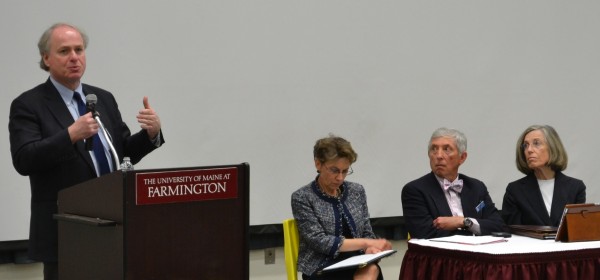
FARMINGTON – Facing a $36 million budget shortfall with 165 full-time positions projected to be cut in the next fiscal year, University of Maine System Chancellor James Page said all seven campuses will need to work together and promised change is coming.
Page, speaking at Lincoln Auditorium filled with mostly faculty and staff on the University of Maine at Farmington campus Wednesday, said at the heart of the projected loss over the 2014-15 fiscal year is the economy’s downturn over the last several years. With tougher economic times, fewer students are enrolling, costs have increased while there have been cutbacks in state and federal funding. Maine’s median household income, which has declined since 2007, means fewer families can afford to send their children to college.
He termed the budget shortfall as “unacceptable” and “not a one-time event. We have to change some things.” Page said the campuses have to collaborate as a team. He congratulated the UMF campus for “making the tough decisions to help make up the budget gap.”
Earlier this spring, UMF President Kathryn Foster announced that 18 positions were eliminated, 15 of which are vacant positions and three currently filled, along with other budget reductions. Nearly $3 million was cut from UMF’s $31 million total budget. The other Maine campuses have announced deep cuts as well.
“We know the current root causes,” Page said of the budget woes, “now we’re charged with eliminating those.”
U Maine System trustee, Karl Turner of Cumberland, while noting that “a key to growing the economy successfully is education,” also said “living with the (budget) gap is not the answer.”
He predicted that within a few years the university system will have a smaller footprint- fewer administrators and faculty members; more shared services and heavy use of electronic course work. Of the cuts overall, “it’s going to be hard,” Turner said.
To be successful through the changes, Page said, the seven campuses have to move away from the competitive model and work together. The universities each practice competitive recruitment of students to attend their campuses. The greater the number of students enrolled means a greater share of resources.
Each campus offers different incentives in financial aid. In response to a question from an attendee asking if the inequities in financial aid across the different campuses would be addressed, Page agreed some campuses are able to offer “richer financial aid packages than others” and that it “should be addressed.”
He did note some of the imbalance is due to local endowments, those funding gifts that are often given to a specific campus. The larger campuses have more opportunities for endowment gifts.
Page wants to see all the campuses focused around strategic branding, each one forming its complementary part where needs are met, there’s little duplication of programing and gaps are found and filled for a more efficient system.
“Together we’d have a complete package,” he said.
With off-campus centers of the University of Maine System cropping up, one audience member asked if individual campus identities would be lost. Page said that would be the wrong outcome if it were to happen. Instead, the centers serve as an education outreach to the smaller communities.
Ideas “off the table,” for trustee consideration, Page said he is often asked about, are closing a campus or two to save money, or partnering with the community college system, because both of those would take legislative action to change the statute.
“I still believe in the multi-campus system. Not just for the education value, but it’s an economic driver; social and cultural centers in their regions.”





Our Public Universities are being eroded by the degree mills like U of Phoenix and Kaplan. You can buy a PhD on line from an accredited University on Florida. Long term, the lack of a strong Public education system from pre-school to College will continue to hurt Maine and income will further decline.
The state needs to bolster funding for all Public education. States that make Public education a priority always grow. Cutting corporate taxes will do nothing. The jobs won’t come to Maine if there is not a strong workforce and a sold infrastructure.
As long as people lack proper priorities, the decline of Mane will continue. The coast line and York county will be fine but the rural areas will continue to suffer